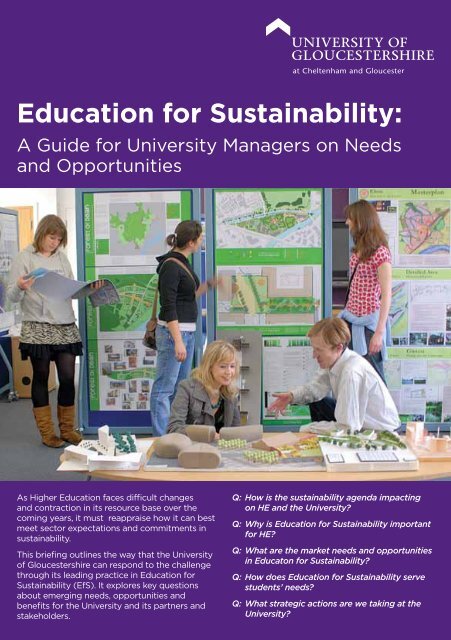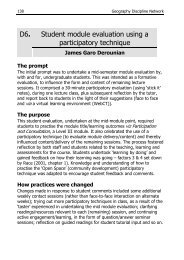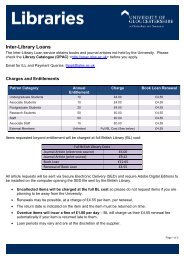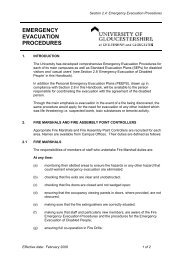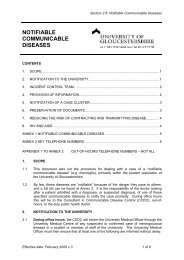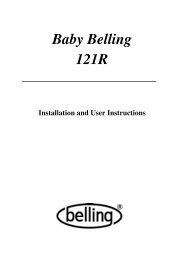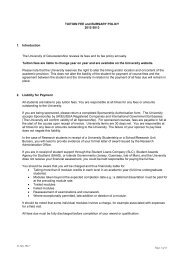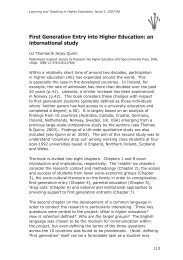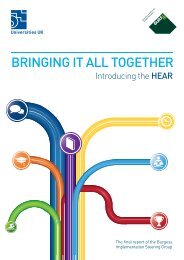Education for Sustainability: - Insight – University of Gloucestershire
Education for Sustainability: - Insight – University of Gloucestershire
Education for Sustainability: - Insight – University of Gloucestershire
You also want an ePaper? Increase the reach of your titles
YUMPU automatically turns print PDFs into web optimized ePapers that Google loves.
<strong>Education</strong> <strong>for</strong> <strong>Sustainability</strong>:A Guide <strong>for</strong> <strong>University</strong> Managers on Needsand OpportunitiesAs Higher <strong>Education</strong> faces difficult changesand contraction in its resource base over thecoming years, it must reappraise how it can bestmeet sector expectations and commitments insustainability.This briefing outlines the way that the <strong>University</strong><strong>of</strong> <strong>Gloucestershire</strong> can respond to the challengethrough its leading practice in <strong>Education</strong> <strong>for</strong><strong>Sustainability</strong> (EfS). It explores key questionsabout emerging needs, opportunities andbenefits <strong>for</strong> the <strong>University</strong> and its partners andstakeholders.Q: How is the sustainability agenda impactingon HE and the <strong>University</strong>?Q: Why is <strong>Education</strong> <strong>for</strong> <strong>Sustainability</strong> important<strong>for</strong> HE?Q: What are the market needs and opportunitiesin Educaton <strong>for</strong> <strong>Sustainability</strong>?Q: How does <strong>Education</strong> <strong>for</strong> <strong>Sustainability</strong> servestudents’ needs?Q: What strategic actions are we taking at the<strong>University</strong>?
<strong>Education</strong> <strong>for</strong> <strong>Sustainability</strong> A Guide <strong>for</strong> Managers<strong>Education</strong> <strong>for</strong> <strong>Sustainability</strong> A Guide <strong>for</strong> ManagersHow is the sustainability agendaimpacting on HE and the <strong>University</strong>?Since the UK government producedits sustainable development strategySecuring the Future in 2005, the devolvedadministrations have developed policiesand plans to improve sustainability practicein universities. Corporate sustainabilitymeasures and rankings are increasing inprominence and this is likely to become moresignificant in an era <strong>of</strong> greater universitycompetitiveness and accountability. The<strong>University</strong> <strong>of</strong> <strong>Gloucestershire</strong> has per<strong>for</strong>medwell to date:• No 1 and No 2 rankings in the studentdrivenPeople & Planet Green League <strong>of</strong>UK Universities - the only university to havebeen consistently placed in the top fivesince the League began.• Improved score and sector average rankin the BITC Universities that Count schemesince 2008 plus No 1 ranking (91.6% score)<strong>for</strong> teaching, learning and research in 2010.• National Green Gown award <strong>for</strong> continuousinstitution-wide improvement in 2008.• National Green Gown award <strong>for</strong> strategicinstitutional development <strong>of</strong> EfS in 2010.Why should universities engage withsustainability?• to meet expectations <strong>of</strong> sector fundingagencies in carbon reductions andsustainability per<strong>for</strong>mance• to improve sector pr<strong>of</strong>ile and marketdifferentiation as well as internationalvisibility• to improve employability rates andrecruitment by focusing on graduates’pr<strong>of</strong>essional skills <strong>for</strong> sustainability• to provide leadership on localsustainability enterprise, innovation andengagementThe HE Funding Council <strong>for</strong> England setsout its rationale and expectations in its2008 Sustainable Development in Higher<strong>Education</strong> strategy and action plan.As sustainability agendas enter themainstream, universities are acceleratingtheir per<strong>for</strong>mance and opportunities to showleading practices are shrinking.The <strong>University</strong> <strong>of</strong> <strong>Gloucestershire</strong> hasincreased its commitments by incorporatingsustainability in its Strategic Plan (2009)and developing its sustainability strategyPromising Futures 2009-2015, spanning allareas <strong>of</strong> core business.At the <strong>University</strong>, sustainability goes beyondreducing our footprint and environmentalimpacts <strong>–</strong> it is about improving prospectsand quality <strong>of</strong> life <strong>for</strong> students and staff, andin the local, national and global communitieswe serve. In EfS, the <strong>University</strong> has gainedsector recognition, several awards andvaluable funding - a significant plat<strong>for</strong>m <strong>for</strong>further innovation.EfS - Background and OriginsThe EfS movement emerged from global<strong>for</strong>ums such as the Rio Summit in 1992and Johannesburg World Summit onSustainable Development in 2002, gainingmomentum via the United NationsDecade <strong>of</strong> <strong>Education</strong> <strong>for</strong> SustainableDevelopment (UN DESD) 2005-2014.International HE declarations such asTalloires (1990) and Lüneberg (2001) havegained the support <strong>of</strong> growing numbers<strong>of</strong> Vice-Chancellors, with promises toreorient courses to support sustainability.Why is <strong>Education</strong> <strong>for</strong> <strong>Sustainability</strong>important <strong>for</strong> HE?Universities hold civic responsibilities to actas beacons <strong>for</strong> society, leading innovationand illuminating pathways towards moresustainable futures. These duties are fulfilledon the widest scale through the educationthey provide <strong>for</strong> future leaders and decisionmakers.To date the academic success storiesin sustainability have mainly been in:• sustainable development research withsmall scale curriculum <strong>of</strong>fshoots.• generic student ‘taster’ initiatives such asintroductory elective modules.• named ‘sustainable development’programmes suited to niche markets.EfS uses approaches to learning and changethat engage people in thinking critically andcreatively about the future. Its principles areused in all <strong>for</strong>ms <strong>of</strong> learning, from <strong>for</strong>mal tocommunity education and across all fields<strong>of</strong> pr<strong>of</strong>essional training and development.There are signs that both students andemployers are demanding action fromHigher <strong>Education</strong> on this agenda, so thatthe university sector plays a decisive rolein shaping future capabilities to addresssustainability across pr<strong>of</strong>essions andorganisations.Recent major funders <strong>of</strong> EfS projects atthe <strong>University</strong>• Marie Curie Fellowship• Higher <strong>Education</strong> Funding Council <strong>for</strong>England• Kraft Foods• Grundtvig Programme• Environmental Association <strong>of</strong>Universities and Colleges• UNESCO• Rikkyo <strong>University</strong>, JapanTotal grants won over 24 months: £523,385However, strategic work to embedsustainability thinking across universities isnot common. Worldwide, few universitieshave attempted large scale educationalinnovation in line with EfS. This is where the<strong>University</strong> <strong>of</strong> <strong>Gloucestershire</strong> has distinctiveexpertise and future opportunities lie.2 Tel: 0844 801 0001 Web: www.glos.ac.uk: +44(0)1242 715 378 E: dtilbury@glos.ac.uk Tel: 0844 801 0001 Web: www.glos.ac.uk 3
<strong>Education</strong> <strong>for</strong> <strong>Sustainability</strong> A Guide <strong>for</strong> Managers<strong>Education</strong> <strong>for</strong> <strong>Sustainability</strong> A Guide <strong>for</strong> ManagersIn summary, the external trends pointto two distinct areas <strong>of</strong> opportunity:1 Signs that demand will increase <strong>for</strong>graduates who are more employable asthey are not only aware <strong>of</strong> sustainabilityissues, but have the competence to tacklethem, and that future students will factorthis into their HE choices- This requires the strategic approachto embed generic capabilities intocourses and tailor learning <strong>for</strong>sustainability to each subject area.2 Likely growth in demand <strong>for</strong> the delivery<strong>of</strong> pr<strong>of</strong>essional development programmes<strong>for</strong> sustainability, geared to the needs <strong>of</strong>specific groups- This requires expertise in using EfSapproaches to design and facilitatebespoke training and development<strong>of</strong>ferings in sustainability.The <strong>University</strong> <strong>of</strong> <strong>Gloucestershire</strong> hasestablished itself as a distinctive player in EfS,with its No.1 ranking in the Universities thatCount index and winning the Green Gownaward in 2010.Leading Curriculum Change <strong>for</strong><strong>Sustainability</strong>From 2010 to 2012 the <strong>University</strong> is hostingan ambitious strategic project funded bythe Higher <strong>Education</strong> Funding Council <strong>for</strong>England to bring EfS more deeply intothe arena <strong>of</strong> quality enhancement andcurriculum development, working with fivepartner universities.Consideration needs to be given to areas <strong>of</strong>risk and most fruitful investment <strong>of</strong> ef<strong>for</strong>t,but there are several potential benefits to begained by continuing to develop this pr<strong>of</strong>ile:• Drawing on Tradition <strong>–</strong> the <strong>University</strong>’shistory and pr<strong>of</strong>ile in teaching and learninginnovation• Securing the USP <strong>–</strong> the <strong>University</strong>’sstrategic work in EfS is distinctive andsector-leading• Income Generation <strong>–</strong> bespoke andpr<strong>of</strong>essional courses, consultancy andpartnerships in EfS• Improving Efficiency <strong>–</strong> EfS promotesunified academic enhancement processes• Sector Fit <strong>–</strong> EfS aligns with global trendstowards integrated curriculum change• Graduate Employability <strong>–</strong> responsiveness<strong>of</strong> EfS to student employability concernsWhat strategic actions are we taking atthe <strong>University</strong>?Promising Futures 2009-2015 sets outstrategic targets <strong>for</strong> action to improve pr<strong>of</strong>ileand expertise across the <strong>University</strong> in EfS.These actions are designed to provide acoherent learning experience <strong>for</strong> students.They encourage unity <strong>of</strong> approach aroundteaching and learning principles, but allowthe freedom <strong>for</strong> programme innovation to bedriven by subject specialists. They also aim<strong>for</strong> better alignment <strong>of</strong> EfS with the driveto improve employability, entrepreneurshipand internationalisation strategies across the<strong>University</strong>.EfS approaches are embedded in theprinciples <strong>of</strong> the <strong>University</strong>’s Learning andTeaching Strategy and its set <strong>of</strong> GraduateAttributes. Colleagues at the <strong>University</strong> aresupported by a framework <strong>for</strong> effectiveteaching and learning in EfS which includessubject guides linked to national qualitybenchmarks and the priorities <strong>of</strong> individualacademic areas.Our current priorities in this area include:• identification <strong>of</strong> graduate capabilitiesand attributes in EfS, derived from thelearning needs identified by studentsand employers• development <strong>of</strong> ‘real-world’ workfocusedand community-focusedlearning activities and placementopportunities geared to sustainability• leading a national project to bring EfSinto the quality enhancement arenaand to change academic practiceacross five partner universities• strategic support to embedsustainability across core courses,including staff development activitiesto build capacity in EfS• development <strong>of</strong> major funding bidsand research consultancy workthrough the International ResearchInstitute in <strong>Sustainability</strong> (IRIS)• opportunities <strong>for</strong> curriculum projectsand <strong>for</strong> co-curricular learning linkedto our corporate operations,campus activities and Employable<strong>Gloucestershire</strong> Graduates Scheme6 Tel: 0844 801 0001 Web: www.glos.ac.uk: +44(0)1242 715 378 E: dtilbury@glos.ac.ukTel: 0844 801 0001 Web: www.glos.ac.uk 7


